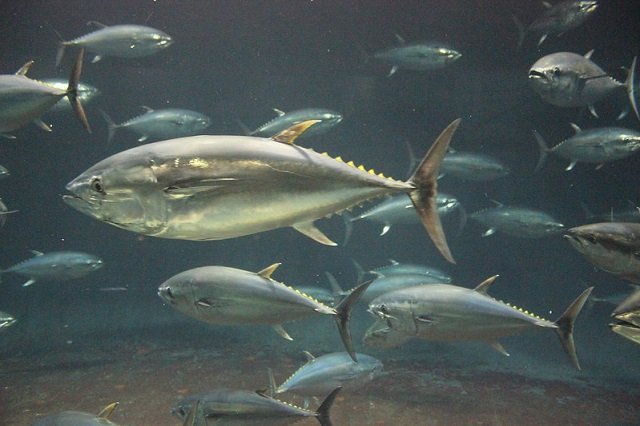USA.- The University of New England (UNE) has been chosen as the United States representative to the AquaVitae Consortium, a new international research and industry enterprise formed to accelerate the development, education and communication of sustainable low-trophic aquaculture in the nations bordering the Atlantic Ocean. UNE joins 35 other partners in this European Commission funded project.
The Horizon 2020 program, an effort to drive economic development through an emphasis on science, leadership and sustainability, is funding the 8 million Euro ($8.9M) project. Over the next four years, they will work to increase aquaculture production of low-trophic species (which are species that are low on the food chain) in 16 different countries, spread across four continents. In addition to Europe, partners are situated in countries bordering the Atlantic Ocean including Brazil, South Africa, Namibia and in North America.
UNE’s School of Marine Programs and UNE NORTH – The Institute for North Atlantic Studies will play key roles in developing training and education pathways to support the region’s growing aquaculture ecosystems. UNE is partnering with NOFIMA – the Norwegian Institute of Food, Fisheries and Aquaculture Research – to fund travel to partner institutions, collaborate in research and develop best practices.
“It’s an exciting challenge to bring together industry and research partners from across the length and breadth of the Atlantic to address relevant societal challenges,” says Project Coordinator Philip James.
“It’s a tremendous honor to be the only U.S. institution in the consortium,” says Barry Costa-Pierce, executive director of UNE NORTH. “For UNE faculty and students, AquaVitae provides information and interactions with 35 consortium partners in higher education, national research institutes and industries involved in a wide range of aquaculture disciplines such as hatchery production, processing, resource management, economics, environmental monitoring, product development, marketing and consumer behavior.”
Aquaculture value chains
The project’s purpose is to introduce new low-trophic species, products and processes in marine aquaculture value chains across the Atlantic. The five chosen value chains include macroalgae, Integrated Multi-Trophic Aquaculture (IMTA), echinoderm species (e.g. sea urchins), shellfish and finfish. IMTA is a process that farms several species together using waste from one species as feed for another.
According to Maine’s Department of Marine Resources, there were 672 aquaculture leases covering nearly 800 acres along the coast in 2018 with a total harvest value of $71.75M. “In addition, new land-based RAS systems for salmon have been proposed with total investments exceeding $500M,” says Costa-Pierce.
Stay Always Informed
Join our communities to instantly receive the most important news, reports, and analysis from the aquaculture industry.
“The value chains were selected because of their promising contributions to sustainable food and feed production. There is a lot of potential in these value chains and we wish to discover new ways to improve them,” says James.
This correlates with recommendations made in the Food from the Oceans report (2017), which highlighted the need to expand low- and multi-trophic marine aquaculture as an ecologically efficient source of increasing food and feed.
Cross-cutting activities
To complete the objectives, 11 case studies will be conducted across the Atlantic, with emphasis on developing new products from low-trophic species (e.g. macroalgae and sea urchins), optimizing production in existing industries (e.g. shellfish and finfish) and moving towards zero waste and a circular economy in aquaculture (e.g. IMTA and Biofloc).
Some of the cross-cutting activities involve research into biosensors, Internet of Things (IoT), product characteristics, market potential, sustainability, environmental monitoring, as well as conducting risk assessments, analyses of value chains, studying profitability and the legal framework.
Furthermore, the project will implement a multi-actor approach to ensure stakeholder involvement in all phases of the project. Companies act as partners of the consortium together with research institutes and universities, which will also help to establish a durable aquaculture industry and research network around the Atlantic Ocean.
The University of New England is Maine’s largest private university, featuring two distinctive campuses in Maine, a vibrant campus in Tangier, Morocco, and an array of innovative offerings online. Our hands-on, experiential approach empowers students to join the next generation of leaders in their chosen fields. We are home to Maine’s only medical and dental colleges, a variety of other interprofessionally aligned health care programs, and nationally recognized degree paths in the marine sciences, the natural and social sciences, business, the humanities and the arts.
Horizon 2020 is the biggest Research and Innovation program of the European Union with nearly €80 billion of funding for the period 2014- 2020. It selects outstanding research proposals for taking great ideas from the lab to the market.
Source: University of New England
Editor at the digital magazine AquaHoy. He holds a degree in Aquaculture Biology from the National University of Santa (UNS) and a Master’s degree in Science and Innovation Management from the Polytechnic University of Valencia, with postgraduate diplomas in Business Innovation and Innovation Management. He possesses extensive experience in the aquaculture and fisheries sector, having led the Fisheries Innovation Unit of the National Program for Innovation in Fisheries and Aquaculture (PNIPA). He has served as a senior consultant in technology watch, an innovation project formulator and advisor, and a lecturer at UNS. He is a member of the Peruvian College of Biologists and was recognized by the World Aquaculture Society (WAS) in 2016 for his contribution to aquaculture.






